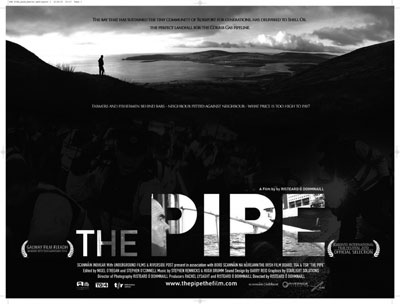Over 30 years of anarchist writing from Ireland listed under hundreds of topics
Review: The Pipe
 This film brings to the big screen the dramatic story of Shell’s blundering, sometimes violent, attempts to impose a high-pressure raw gas pipeline on a small North Mayo community. The documentary features footage taken over three years, from 2006 to 2008, by Risteard O’Domhnaill. It has all the ingredients, stunning landscapes, riveting action scenes and the real-life stories of local people who found themselves on the front line of the drama. The film is short on background to the whole issue and mentions very little on the actual dangers posed by the pipeline and refinery, as well as the giveaway terms the oil companies ‘extracted’ from Irish state. However, in Willie Corduff, and particularly in Pat O’Donnell, the filmmaker has struck cinema gold. Through the words and, especially, the actions of these figures we get a good picture of just what’s at stake here and what it takes to engage in effective resistance.
This film brings to the big screen the dramatic story of Shell’s blundering, sometimes violent, attempts to impose a high-pressure raw gas pipeline on a small North Mayo community. The documentary features footage taken over three years, from 2006 to 2008, by Risteard O’Domhnaill. It has all the ingredients, stunning landscapes, riveting action scenes and the real-life stories of local people who found themselves on the front line of the drama. The film is short on background to the whole issue and mentions very little on the actual dangers posed by the pipeline and refinery, as well as the giveaway terms the oil companies ‘extracted’ from Irish state. However, in Willie Corduff, and particularly in Pat O’Donnell, the filmmaker has struck cinema gold. Through the words and, especially, the actions of these figures we get a good picture of just what’s at stake here and what it takes to engage in effective resistance.
Divisions inside the campaign, especially in 2007, are also covered. There’s dramatic footage of shouting matches at campaign organising meetings. In these scenes, prominent activist Maura Harrington is painted as angry and belligerent but there seems to be a greater focus on getting some good movie drama than on giving us any explanation of the issues behind these arguments. In fact, the real story here is perhaps that of a community managing to stick together in the face of extreme pressures and frequent violence at the hands of an oil giant, its private security thugs and its close allies among the forces of the state - the guards, the navy (!), the courts and prisons.
Divisions in the campaign stemmed for the most part from a period of high tension in October and November 2006. In fact, the most remarkable footage taken by O’Domhnaill comes from a protest, a ‘day of action’ held at this time, when Gardai baton charged the assembled crowd, images which made national news at the time, leading possibly to more public scrutiny of the State and Shells violent tactics. A follow-up demonstration was called, only to be cancelled closer to the date. The effect of this action by the local campaign was to deflate the whole struggle for probably a couple of years and to effectively vindicate the Guards violent tactics. In the film, the only analysis of this key moment comes from Maura Harrington. She blamed a ‘lack of courage’, yet there was much more than this involved. The Mayo campaign, in an effort to stay united, had caved in to the wishes of a conservative but influential minority, most especially local TD Jerry Cowley and campaign spokesperson Mark Garavan. This whole episode also highlighted the failure of campaigning and political groups from outside the area to better support a traumatised community and to give that community the support it needed to hold firm at this crucial time.
The documentary’s central theme, however, is well presented. Local people had fears related to health and safety issues; on the basis of these fears they refused their consent to the project going ahead and for many years fought to stop the project from getting off the ground. Years later, their concerns have still not been addressed, the contentious pipeline is still not built and resistance is ongoing. ‘The Pipe’ catches the spirit of this resistance beautifully.

